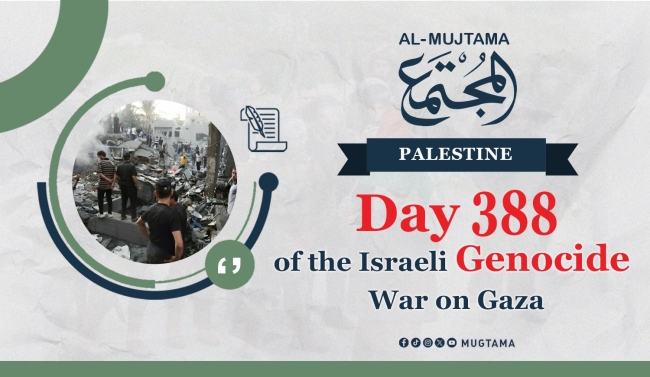On the 388th day of the "Storm of the Al-Aqsa Mosque" operation, the occuption forces are still launching air attacks and heavy artillery bombardment on the Gaza Strip, leading to brutal massacres of innocent civilians. Here are the main points of the progress:
- Intensification of extermination operations in northern Gaza
For over three weeks, the occupation has been escalating its shelling on the northern areas of the Gaza Strip, specifically in Jabalia camp and Beit Lahia town, where civilians are continuously being shelled and their homes targeted directly.
Anadolu Agency quoted eyewitnesses as saying that Israeli forces are reinforcing their presence around Jabalia camp, imposing a complete siege that prevents the entry of essential supplies, warning of a severe humanitarian crisis that may include famine and thirst.
- Urgent medical appeals to save Kamal Adwan hospital
The Ministry of Health in Gaza called on international institutions to send urgent surgical medical teams to support Kamal Adwan hospital in the northern Gaza Strip after the occupation arrested the majority of medical staff there.
According to the ministry's statement, there is only one pediatric specialist left in the hospital, posing a major challenge in treating the increasing number of casualties.
The Director-General of the Ministry of Health in Gaza, Munir al-Bursh, confirmed that the occupation had arrested about 40 medical staff, with 30 of them still under arrest, dealing an additional blow to the collapsing health system.
- "Israeli" analyst: Occupier's losses are significant in October
Israeli military analyst Amos Harel mentioned that October is the bloodiest month for the occupation army since the beginning of the year, with significant human casualties that may lead the public to demand an end to the war.
He pointed to the deaths and injuries of dozens of soldiers in clashes in southern Lebanon and the Gaza Strip, reflecting the pressure faced by the army.
- Hamas rejects a partial ceasefire
Sources revealed to "Quds Press" that Hamas expressed reservations about proposals for a temporary ceasefire that includes a partial exchange deal.
The informed source explained that Hamas, considering the responsibility placed on its shoulders, is willing to seriously consider mediator's offers while ensuring that the conditions serve the interests of the Palestinian people.
The source refused to comment on the news related to a temporary deal involving the exchange of 5 non-Israeli prisoners in the possession of the Palestinian resistance in Gaza. They will be in exchange for the release of an unspecified number of Palestinian prisoners in Israeli occupation prisons, as part of a temporary ceasefire agreement and calm for only two weeks, including the entry of special aid to the northern areas of Gaza.
The source said: "The occupation condition is to keep its army in the areas, without moving the vehicles during the period of calm, and this is something that Hamas rejects, supported by its position from all factions of resistance, and derives its strength from the resilience and support of the Palestinian people in the sector."
Discussing a Ceasefire in Gaza
In the Qatari capital, Doha, intensive meetings continue in order to reach an agreement to stop the ceasefire and complete a prisoner exchange deal.
The Qatari Foreign Minister Sheikh Mohammed bin Abdulrahman Al Thani, the Director of the CIA William Burns, along with the head of the Israeli intelligence agency Mossad, David Barnea, are participating in these talks, according to the "Al Jazeera Net" website.
According to what was reported by Reuters, the talks aim to reach a short-term agreement to stop the ceasefire, including the release of some prisoners and detainees held by both parties.
Netanyahu and Gantz
Escalating disagreements between Netanyahu and Gantz regarding the management of the war
Hebrew reports indicate escalating tension between the Prime Minister of the occupation, Benjamin Netanyahu, and Defense Minister Yoav Gantz, regarding the management of the war on Gaza.
Gantz pointed out in a message to senior officials that "the war is being managed without a clear compass," calling for a reassessment of goals and strategies, reflecting the increasing criticisms of the occupation government's performance in managing operations.


